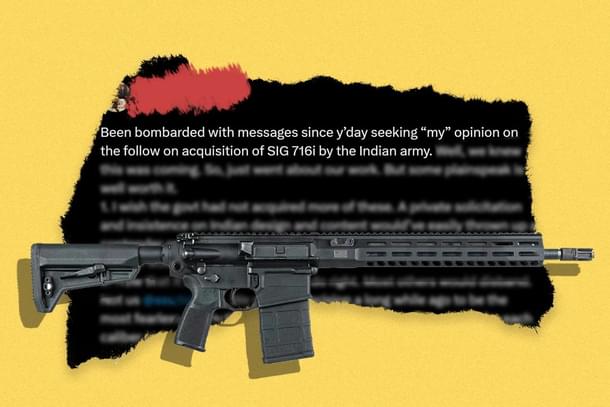Defence
This Post By An Indian Arms Maker Is Difficult To Read
Prakhar Gupta
Aug 28, 2024, 02:18 PM | Updated Sep 05, 2024, 11:45 AM IST
Save & read from anywhere!
Bookmark stories for easy access on any device or the Swarajya app.


In 2019, Indian media buzzed with a long-awaited success story: for the first time, an Indian company, based in Bengaluru’s Koramangala, designed and developed two sniper rifle prototypes for the armed forces entirely in India.
This achievement was not just a triumph for SSS Defence but also a significant moment for the Indian defence sector, which had delivered fighter jets yet faced challenges in creating a reliable rifle and other small weapons for its soldiers. It was a rare glimmer of hope for a sector long plagued by bureaucratic delays and dependency on foreign arms.
Fast forward five years, and that initial enthusiasm has faded into a bitter echo.
On 27 August 2024, the Indian Army placed an emergency order for 73,000 SIG 716 G2 rifles from the United States (US), underscoring a jarring reality: despite significant strides in indigenising defence production, the Indian military remains reliant on foreign arms for its critical needs.
This latest acquisition follows a previous order of 72,400 SIG 716 rifles in 2019 — a move that was supposed to signify a turning point but now highlights a disappointing stagnation.
In February 2019, the procurement of SIG SAUER rifles was a temporary fix, a stopgap measure under the ‘Buy (Global)’ category. Fast forward to today, and we find ourselves in the same situation, with the government again turning to foreign sources for essential weaponry.
The irony stings deeply when juxtaposed against the backdrop of India’s defence production achievements. Since 2019, the sector has seen a significant rise in production and exports, with a record high of Rs 21,083 crore in defence exports for FY 2023-24.
Despite these successes, the repeat order for SIG SAUER rifles highlights a painful truth: our indigenously developed weapons are not being given a fair shot against their foreign counterparts.
Vivek Krishnan, the founder of SSS Defence, articulated this disappointment with a poignant message on social platform X. It serves as a heartbreaking commentary on the state of Indian defence manufacturing.
“Been bombarded with messages since y’day seeking “my” opinion on the follow on acquisition of SIG 716i by the Indian army. Well, we knew this was coming. So, just went about our work. But some plainspeak is well worth it... I wish the govt had not acquired more of these. A private solicitation and insistence on Indian design and content would’ve easily thrown up a contender or many in fact. Testing the same against the in service system would’ve been rather easy...”
Krishnan’s candidness reflects the anguish of many who have either followed or laboured tirelessly to bring Indian-made weapons into the limelight.
He laments that the opportunity to test and validate domestic designs against global benchmarks was missed. Instead, the repeated reliance on foreign arms undermines the very essence of the ‘Make in India’ initiative.
Krishnan’s message cuts to a deeper, troubling issue: the lack of pride or trust in Indian defence products, which is often seen in the Indian military too. He underscores that this pride was long lost due to the legacy of substandard weapons churned out by the government-controlled sector. Yet, when the private sector is striving to build pride and trust with relentless efforts to produce high-quality weapons and secure acceptance, it faces monumental challenges in the form of decisions like the SIG rifle order.
Krishnan wryly points out that while Indians often gain respect from global peers, it takes longer for that recognition to come at home. The Indian military seems more impressed by shiny equipment from foreign companies than by what India’s own private sector, which is increasingly successful abroad, has to offer.
Krishnan isn’t asking for a free pass; he’s calling for a thorough and transparent evaluation. His proposal is straightforward: subject indigenous weapons to rigorous testing against global benchmarks and make the results public, just as serious military organisations do. His push for open testing and results is a plea that private sector players in the defence sector have made for years — a fair chance to prove that Indian innovation can stand up to the best out there.
To make real progress, Indian private sector players need a fair chance, with genuine trust and pride in what we create. The ‘Make in India’ promise should be more than just talk — it should result in tangible, locally developed defence solutions that the Indian military embraces.
Prakhar Gupta is a senior editor at Swarajya. He tweets @prakharkgupta.




